Key takeaways:
- Creating an open and welcoming environment is essential for encouraging creativity and vulnerability among workshop participants.
- Active engagement through interactive activities and constructive feedback fosters collaboration and personal growth within the group.
- Setting clear goals and preparing stimulating materials enhance the workshop experience and build a sense of community.
- Reflecting on workshop outcomes and participant feedback is crucial for continuous improvement and adapting future sessions to better meet diverse needs.
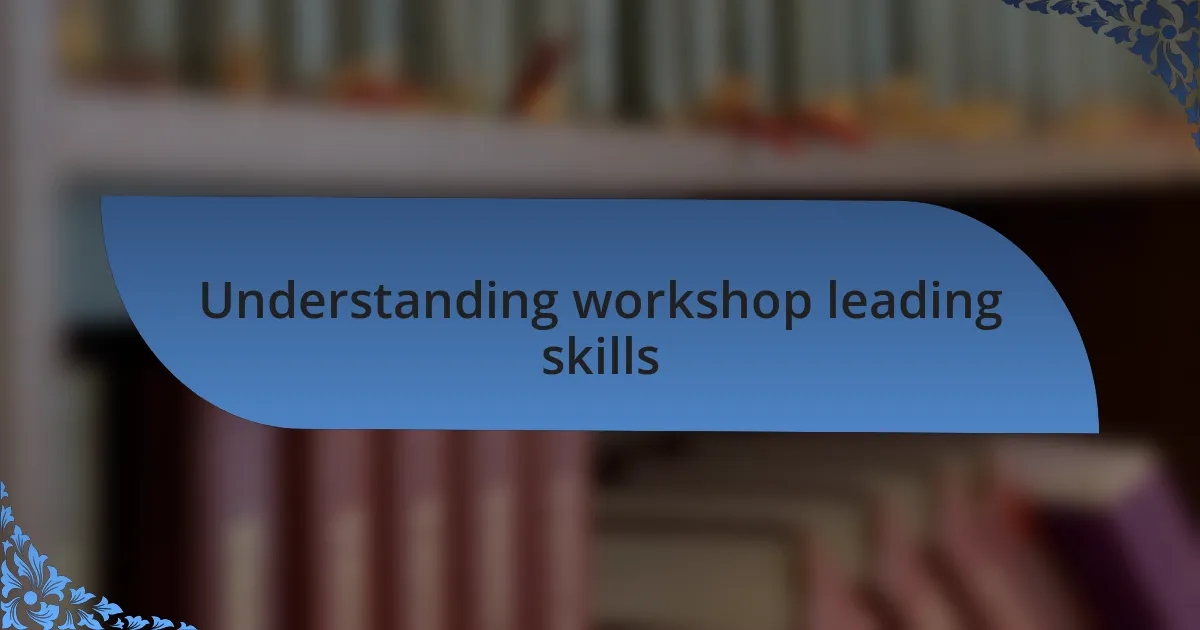
Understanding workshop leading skills
Leading a workshop requires a delicate balance of guidance and freedom. I remember a time when I stepped back to let participants share their thoughts, only to be amazed at the richness of the discussion that unfolded. This experience taught me that fostering an open environment is crucial; it invites creativity and makes everyone feel valued.
Communication lies at the heart of effective workshop leadership. I often find myself reflecting on the moments when I didn’t communicate clearly, and the confusion that ensued. I constantly ask myself, how can I articulate my ideas in a way that resonates with diverse poets? The key is to be both accessible and engaging, which encourages participation and nurtures a collaborative spirit.
Empathy cannot be overlooked in this role. I vividly recall a participant who was hesitant to share their work; their vulnerability reminded me of the courage it takes to be authentic. How can we create a safe space for expression? By connecting with participants on an emotional level, we allow their voices to emerge and flourish, transforming the workshop into a shared journey of discovery.

Importance of poetry workshops
Poetry workshops play a vital role in nurturing creativity and building a community among writers. I recall a workshop where a participant, initially hesitant, shared a piece so deeply personal that it resonated with everyone. This moment highlighted how sharing work in a supportive environment can foster connections and encourage vulnerability—essential ingredients for artistic growth.
In my experience, workshops also serve as a breeding ground for new ideas. There’s something invigorating about hearing diverse perspectives on a single theme. I once facilitated a session focused on nature imagery, and the varied interpretations—from urban landscapes to mythical realms—sparked discussions that illuminated our approaches to poetry. This exchange not only broadens an individual’s artistic repertoire but also encourages collaboration among poets, often leading to unexpected partnerships.
Moreover, the structured feedback during workshops is invaluable. I remember an instance where constructive criticism turned a mediocre piece into a compelling narrative. When participants learn to offer and receive feedback graciously, it cultivates a culture of continuous improvement. Isn’t it rewarding to witness poets evolve right before your eyes, supported by a community that genuinely cares about each other’s growth? That’s the magic of poetry workshops.
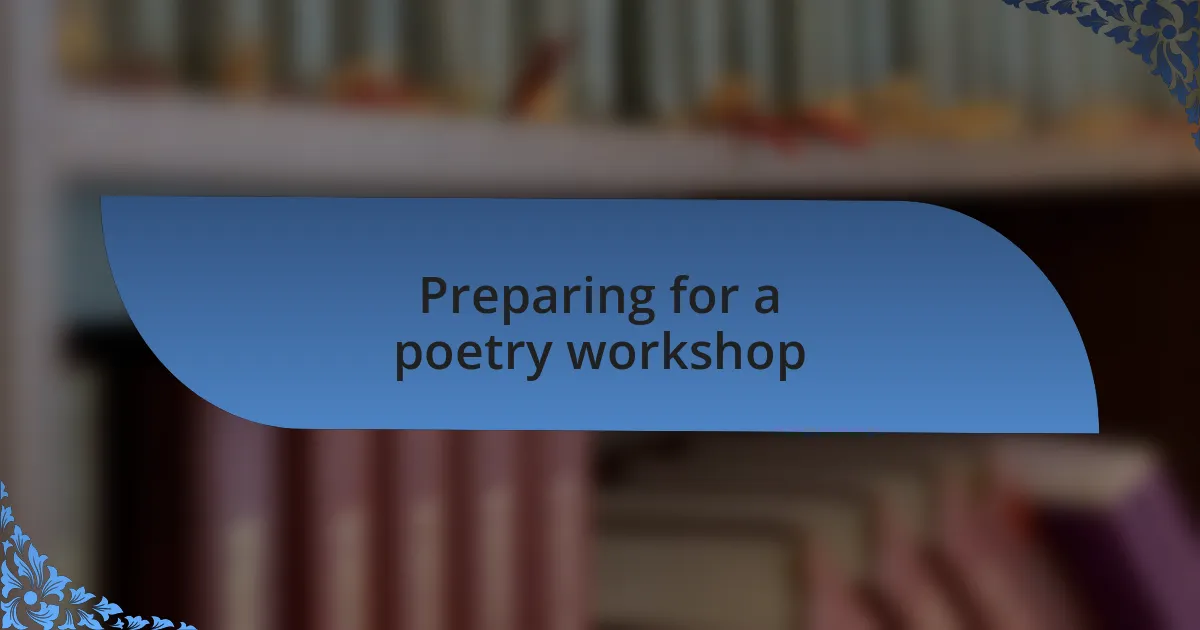
Preparing for a poetry workshop
When preparing for a poetry workshop, I find it essential to set clear goals for what I hope to achieve. One time, I organized a workshop centered around emotional expression, aiming to help participants tap into their innermost feelings. It was fascinating to witness how a cohesive theme not only guided the writing process but also fostered a sense of community among attendees, as we were all aligned in our exploration.
Creating a comfortable environment is another crucial element. I remember walking into a chilly, impersonal venue for a poetry gathering once, and it dampened the mood significantly. Since then, I’ve focused on creating a warm, inviting space—perhaps with soft lighting and cozy seating—that encourages openness and vulnerability. After all, who really wants to share their poetry feeling tense or awkward?
Additionally, gathering inspiring materials is a fun and impactful step. I’ve spent hours curating poetry collections, visuals, and prompts that spark creativity. For instance, I once brought in a series of evocative paintings to ignite imaginations; the results were stunning and unexpected. Isn’t it exhilarating how the right stimuli can unlock hidden potential in writers?
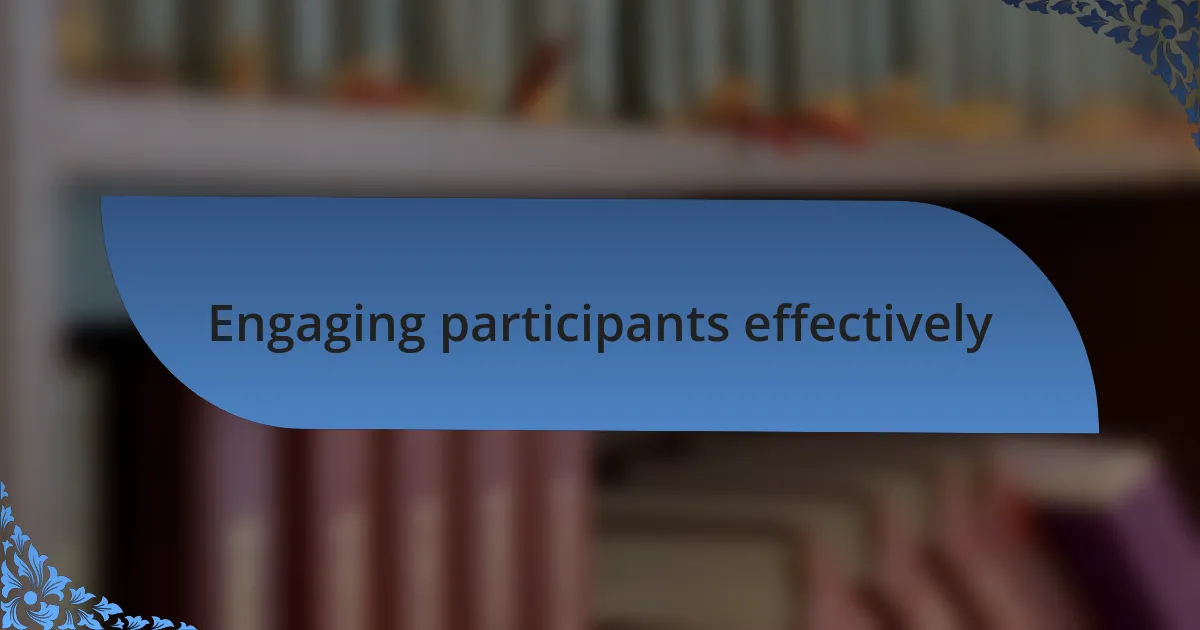
Engaging participants effectively
Engaging participants effectively requires a balance of interaction and guidance. I once led a workshop where I posed a simple question: “What does poetry mean to you?” The room buzzed with energy as participants shared their diverse perspectives. That moment made me realize how vital it is to create space for every voice; it not only enriches the discussion but also lets individuals feel valued and heard.
Incorporating interactive activities can significantly boost engagement. For instance, I introduced a collaborative poem exercise where each participant contributed a line. Seeing everyone’s creativity flow in real-time was exhilarating! It’s this collaboration that often creates a sense of ownership in the workshop, turning a simple gathering into a shared journey of discovery. How have the best workshops you’ve attended made you feel more connected?
Lastly, I’ve discovered that providing constructive feedback fosters a supportive atmosphere. During one session, I installed a “rose, bud, and thorn” feedback method. Participants shared what they loved, what they saw potential in, and areas for growth in one another’s work. This simple framework not only minimized anxiety around critique but also encouraged a culture of support. Can you recall a moment when feedback genuinely helped you grow as a poet? I cherish those moments, as they remind me of the community we build together.
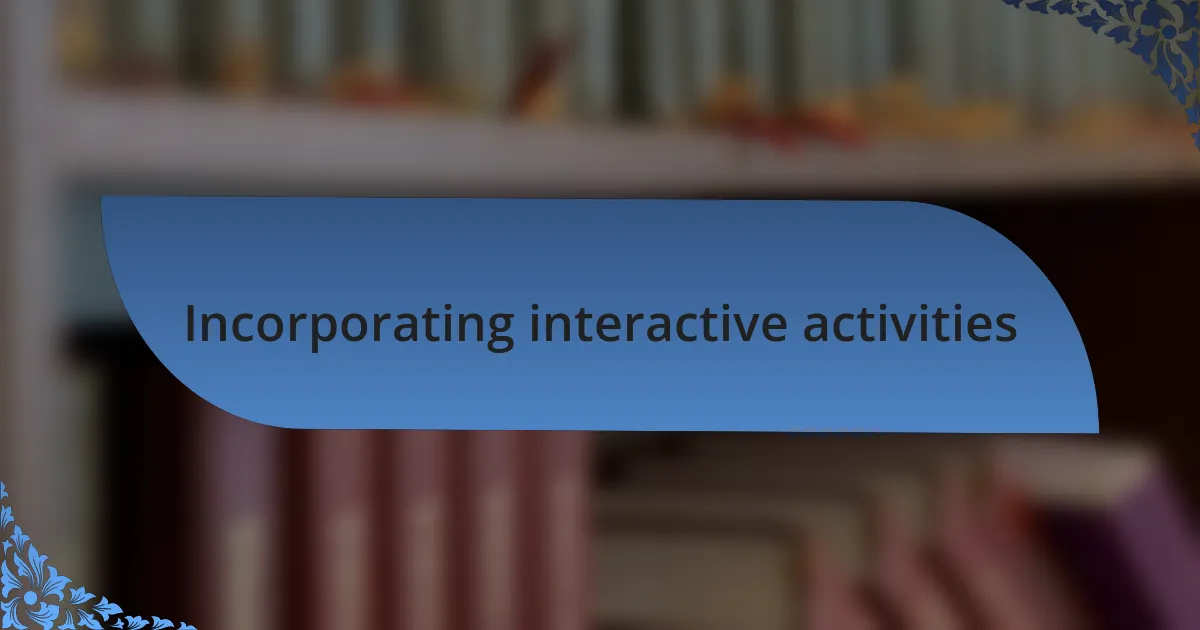
Incorporating interactive activities
Incorporating interactive activities can transform the dynamics of your workshop in unexpected ways. I once launched a “found poetry” activity, where participants sifted through magazines to piece together new poems. Watching their faces light up as they discovered phrases they could rearrange and recontextualize was a powerful reminder of the resourcefulness inherent in creativity. Have you ever seen someone uncover a hidden talent simply because they were given the right tools?
Another effective method I’ve used is live writing challenges, where participants write to a prompt within a tight time frame. One time, I set a five-minute limit for a nature-themed piece, and I was amazed at how quickly voices emerged from the quiet. The adrenaline rush was palpable, and afterward, those who shared their works often expressed newfound confidence. Isn’t it fascinating how a little pressure can unlock so much creative potential?
Lastly, I’ve found that using small group discussions can enrich the workshop experience. During one of my sessions, I paired participants to brainstorm ideas before sharing with the larger group. This approach created an environment where individuals felt safer to share their initial thoughts. The intimacy of small groups often sparks deeper conversations. Have you ever participated in a setting that allowed for such personal interaction? It truly deepens the learning experience when we can connect on a more intimate level.
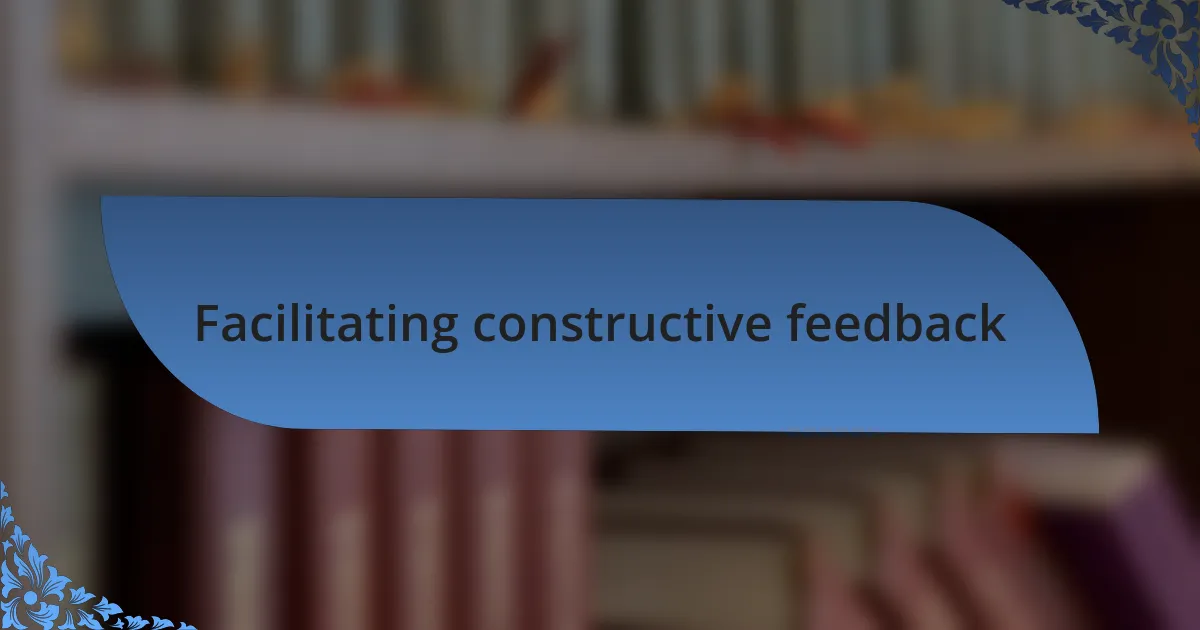
Facilitating constructive feedback
Facilitating constructive feedback is essential for nurturing growth within your workshop. During a session that included peer reviews, I realized that framing feedback as an opportunity for learning rather than critique transformed how participants reacted. I encouraged everyone to highlight what resonated with them first before offering suggestions for improvement. This approach shifted the mood in the room; instead of feeling defensive, participants were more open to hearing different perspectives. Have you ever noticed how starting with positivity can soften the impact of critical thoughts?
I also found that setting clear guidelines for feedback is vital. For instance, I asked participants to focus on specific elements of a poem, like imagery or emotional impact. This step not only kept the discussion on track but also made it easier for them to provide meaningful insights. There was one instance where a participant, initially hesitant, shared how clarifying expectations empowered him to express his thoughts with confidence. Can you remember a time when understanding the parameters of a conversation helped you contribute more effectively?
Lastly, I’ve embraced the “sandwich method,” where I encouraged participants to place constructive criticism between two pieces of praise. This technique proved successful when I led a workshop on editing and revising their own pieces. One participant remarked that this style made him feel valued, which in turn allowed him to embrace feedback rather than shy away from it. Have you ever felt more inspired to grow when surrounded by encouragement?
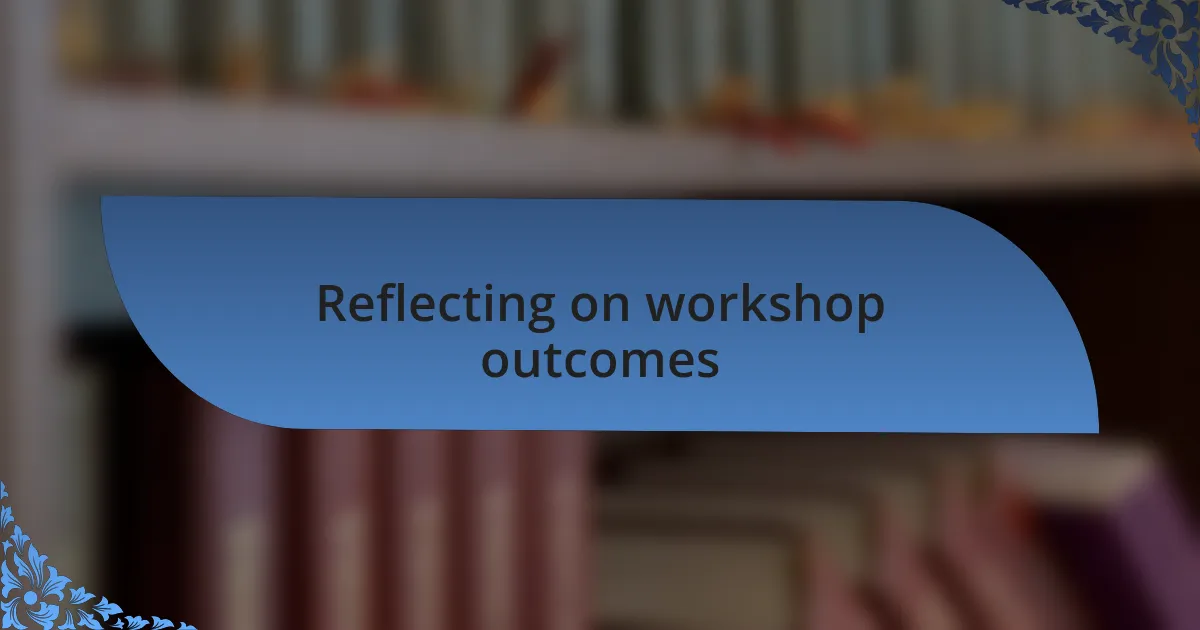
Reflecting on workshop outcomes
Reflecting on workshop outcomes is not just about assessing what went well, but also acknowledging areas for growth. During one of my workshops, I took the time to collect anonymous feedback afterward. It was illuminating to see how participants perceived the session differently than I had anticipated. For instance, one participant shared that they felt intimidated by sharing their work, despite the supportive environment I thought I’d created. Have you ever been surprised by someone’s honest feedback that shed light on how your efforts might be perceived?
As I reviewed the feedback, I realized that reflection fosters not only my growth as a facilitator but also that of the participants. I always aim to create a safe space, yet this experience taught me to dig deeper into how comfort levels vary among individuals. One memorable takeaway was when a quiet participant shared her breakthrough moment, labeling it as “transformative.” This reminded me how essential it is to create intentional moments within the workshop that invite everyone to share. How do you think intentionality shapes the experience of learning together?
The outcomes of a workshop can also inspire future sessions. After I reflected on one particular event, I recognized the need to incorporate more diverse poetry styles to cater to a broader audience. In a subsequent workshop, I introduced various formats like found poetry and performance pieces, which generated excitement and engagement among participants. Witnessing that shift made me realize that adaptation is key—how often do we evaluate our teaching methods to keep them fresh and relevant?